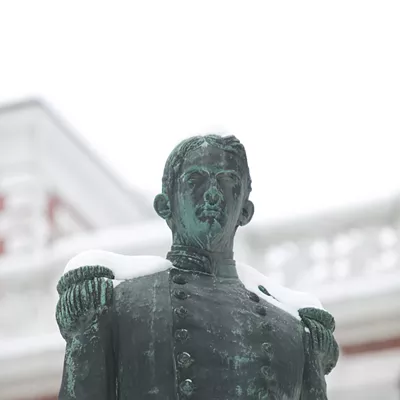Questions about the health and fitness of the Chief Justice of the United States, William Rehnquist, have created a storm of controversy in the American political sphere for months, as Republicans and Democrats fight over who might replace the ailing Rehnquist.
The position is a political appointment. As is the case in the current attempts to replace Attorney General John Ashcroft and Homeland Security Adviser Tom Ridge, should Rehnquist put down the gavel, a candidate for Supreme Court Justice will be hand-selected by the president before being sent to Congress to duke it out. It's a political wrestling match, to be sure, but at least it's a carefully choreographed one.
A similar, though considerably quieter situation is unfolding now in Spokane County, where the departure of former District Court Judge Harold Clarke III for Superior Court has left a mid-term vacancy in the lower circuit. The difference, however, is that unlike at the federal level, in District Court there's no written protocol for how that vacancy should be filled and no built-in checks and balances among local branches of government. County commissioners get to pick Clarke's replacement, who will run out the remaining two years of Clarke's judicial term before being forced to seek re-election in late 2006. (Incumbent judges always have high chances of reelection, which makes the appointment so important.) And as far as the law is concerned, commissioners Phil Harris, Mark Richard and Todd Mielke can make their selection however they choose.
It's one of the few instances in American politics in which members of one branch of government get to reach across and select members for another branch. It's also one of the very few high-profile political appointments county commissioners ever get to make.
All this has some observers worried. With no rules governing their selection process, will the commissioners simply draw names from a hat? Settle it over rock-paper-scissors? Or just toss the job to a faithful supporter?
Spokane County Prosecuting Attorney Steve Tucker worries that it may be the latter. He says he's heard stories about similar appointments, in which commissioners take turns installing their own favorite candidate. In other words, perhaps this time around Harris and Richard could let Todd Mielke appoint the person he wants. Then the next time an appointment comes up, Harris will get the final say, then Richard, and so on.
"I just think that it should be open," says Tucker, an elected official, "and that they should consider a Bar poll instead of just somebody's friend."
Newly elected Commissioner Mark Richard says that he, too, has heard that allowing one commissioner to take the lead on a hire "has happened. That's how's it's been shared to me. I haven't done the research to confirm that."
The commissioners' office has been slow to allay the concerns of Tucker and others. With two of the three commissioners still settling into their new digs (Richard was sworn in only two weeks ago), it's clear that they're not yet on the same page when it comes to the judicial appointment. No deadline has been set for the selection (though Harris says he would like to fill the position in time for the appointee to attend an upcoming judicial conference on Jan. 24), and none of the commissioners agrees completely on what the selection process will look like.
Mielke says that "every process imaginable has been tried in previous appointments" and maintains that they're still discussing the process to be used this time around. Harris says only that they're still receiving letters of application (reports indicate they've received around 13 so far) and that eventually the commissioners will sit down and go through them.
With little accountability for the commissioners, and a lingering uncertainty in their office about how best to make the selection, can anything be done to ensure an appropriate appointment?
The Spokane County Bar Association thinks so. Which is why they drafted a letter to the Board of County Commissioners on Dec. 6, offering to conduct a bar poll and provide their results to help the commissioners make their selection.
The Bar poll -- not to be confused with the more complicated Bar evaluation -- is a three- to five-page page survey sent out to all members of the Bar Association, allowing lawyers to provide feedback on candidates seeking a judicial position. Bar members fill in bubbles ranking a candidate's qualifications in four categories: legal ability, judicial temperament, integrity and relevant legal experience. They can also indicate if they have insufficient information about a candidate.
The surveys are then sent to number-crunchers at Washington State University, who tabulate the information and turn them into a "statistically significant" analysis of bar opinion on the candidates.
Bar polls are routine in cases where candidates are seeking election to positions in district or superior court. In certain cases, the bar association also conducts a thorough evaluation process in addition to simple polling. In cases like this, however, when a judge is to be appointed rather than elected (by commissioners for district court positions, by the governor for superior court), polling is not automatic, but rather an offer of services extended to decision-makers in the case.
Many agree that such a poll is indispensable when considering candidates for judicial positions, as the ability of a candidate to work well and fairly with practicing attorneys is seen to be of great relevance.
And that's why some in the legal community -- and in the Spokane Bar in particular -- are surprised that they've heard nothing back from the county commissioners on their offer to conduct a poll.
When contacted last week, Phil Harris expressed no interest in using a Bar poll as part of the process for the district court vacancy. He said that only about half of practicing attorneys in Spokane County are members of the Spokane County Bar Association and that many non-members feel they "wouldn't stand a chance" in a Bar-conducted poll.
According to the Bar's Dec. 6 letter, Mielke stated during his campaign for commissioner that he would welcome input from the Bar in regard to judicial appointments -- and he does seem uneasy with the idea. He says that he's "leaning towards some sort of review committee that would evaluate the legal credentials of the candidates," adding, "I'm not sure I'm comfortable with that being solely the Bar, but I believe that perhaps representatives on the committee should include members of the [Spokane] County Bar." Richard says much the same, and Mielke cites reasoning similar to Harris, estimating total county membership in the Bar at only about 40 to 45 percent.
In reality, of the 1,432 practicing attorneys in Spokane County (all of whom are required to join the Washington State Bar Association), 1,021 are members of the Spokane County Bar Association. That's about 71 percent membership.
Those involved in the Bar poll, however, disagree with more than just the county's math. Of Phil Harris's insinuation that the poll is biased toward card-carrying members, Bar President Susan Troppman says, "I disagree with him. I have no idea what his rationale is."
Troppman adds that she doubts that Bar membership plays any role in the way that poll participants rank candidates, noting -- accurately -- that no mention of Bar affiliation (or lack of it) is made on the poll itself, and that only if respondents know candidates personally could they judge whether a given candidate is a member.
Matt Andersen, a practicing attorney and the sitting chairman of the Judicial Evaluation Committee for the Bar Association, characterizes Harris' remarks as "unfair and incorrect." He says he's "disappointed that the commissioner would take such a position" and wonders why the commissioners wouldn't want to gather as much information as possible on a pool of candidates. He stresses the relevance of the information provided by the poll. "You would expect that lawyers who are in the courtroom day in and day out and know these candidates, [that] their view should be worth something."
Andersen also registers his surprise at Harris's contention that distrust of the Bar among non-members is a relatively common sentiment. He says, "I have never heard that expressed."
Commissioner Harris explains that one of the reasons he and his colleagues are reluctant to rely on a Bar poll for their decision-making process is that political appointments are "one of the things we hold dear." And though commissioners regularly appoint public works directors and finance directors, appointing a judge is still a big deal.
Plus, he says, the last time they used a Bar poll to appoint a judge (for District Court Judge Mike Padden), "we didn't go with their number one choice, and they got mad at us." He says they haven't used a Bar poll since then.
But Harris' dismissal of Bar help, and his pride in the power of political appointment, may take on a more sinister meaning if rumors circulating throughout the county over the last few months are found to be true. One reliable source says many people think Harris is going to pull rank in the decision process and hire Harvey Dunham, an attorney and pro-tem judge -- and a personal friend of the commissioner.
But Harris laughs that off. "I've heard that before, too," he says, "And that's not correct. A lot of that is speculation by the people seeking appointment or not seeking appointment. I can assure you we would never appoint somebody if one commissioner felt strongly [that they wouldn't make a good judge.]"
He admits that Dunham is a qualified candidate for the position, with seven years as a pro-tem judge and the apparent respect of District Court judges.
On the other hand, Harris says that "most of your political appointments are because of friendships. The president of the United States appointed everybody who helped on his campaign." To refute speculation about his favoritism, however, he says, "I have high enough moral character that I wouldn't appoint him if I didn't feel he was the most qualified guy for the job."


















